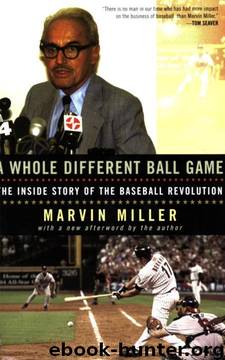A Whole Different Ball Game: The Inside Story of the Baseball Revolution by Marvin Miller

Author:Marvin Miller
Language: eng
Format: mobi
Published: 2010-10-31T07:21:00+00:00
It was finally agreed that any grievance arising out of alleged corruption could be ruled on by the commissioner as long as the player's right to a fair hearing was protected. Hoynes didn't want the contract to contain any language which even suggested the throwing of games and came back with a draft that substituted "public confidence in the game of baseball" for "alleged corruption." I grudgingly agreed on two conditions: We would have the right to renegotiate the provision if Kuhn were replaced as commissioner; and if any commissioner improperly removed a case from arbitration, we had the right to reopen the agreement, demand the end of his authority to deal with any grievance, and, if necessary, strike to support our position.
At the time Hoynes (on Kuhn's behalf) agreed to grievance arbitration, management didn't see the eventual cost to them of this "noneconomic" issue. But this victory was as important as any we would win. Any collective bargaining agreement which can't be enforced by binding, impartial arbitration (or by a strike) isn't worth the paper it's written on. Grievance arbitration put us on the track that led to the Messersmith decision. There were a lot of turns, but we were on track.
As soon as the 1972 strike was announced, the owners and the press sounded off immediately. Red Smith and Leonard Koppett of the New York Times provided, I thought, accurate and balanced reporting, but over all, the players were blasted. Some of the criticism bordered on hysteria. C. C. Johnson Spink, the editor of the Sporting News, called the walkout the "darkest day in sports history," adding, with breathtaking stupidity, that "the whole idea of pensions for major league players may have been a mistake growing out of a misconception of what constitutes a career." Paul Richards of the Braves said, "Tojo and Hirohito couldn't stop baseball but Marvin Miller could." When California owner Gene Autry learned that the Angels-Dodgers exhibition game had been canceled, he said: "We ought to close baseball down forever!" And he called me an extremist!
The press in Cincinnati was particularly virulent-no surprise considering that Reds owner Francis Dale also owned the Cincinnati Enquirer. Reds player rep Jim Merritt was concerned and asked me to talk to the players on April 5, the traditional Opening Day of major league baseball. I flew to Cincinnati.
Download
This site does not store any files on its server. We only index and link to content provided by other sites. Please contact the content providers to delete copyright contents if any and email us, we'll remove relevant links or contents immediately.
Relentless by Tim S Grover(1715)
Relentless: From Good to Great to Unstoppable by Tim S Grover(1322)
Work On Your Game by Dre Baldwin(1290)
Time's Champion by Time's Champion (Craig Hinton & Chris McKeon)(1029)
Good Clean Fun by Nick Offerman(1021)
The Cities by K.A Knight(916)
Calisthenics: Core CRUSH: 38 Bodyweight Exercises | The #1 Six Pack Bodyweight Training Guide by Pure Calisthenics(915)
How to Be Like Mike by Pat Williams(905)
Coach Wooden and Me by Kareem Abdul-Jabbar(899)
Betaball by Erik Malinowski(883)
The Blueprint by Jason Lloyd(866)
Dream Team by Jack McCallum(854)
Friends Lovers and Family by Unknown(824)
The Punch by John Feinstein(808)
Red and Me by Bill Russell(792)
LeBron, Inc. by Windhorst Brian;(782)
Long Shots by Jay Bilas(764)
Seven Seconds or Less by Jack McCallum(733)
Rise and Fire by Shawn Fury(729)
